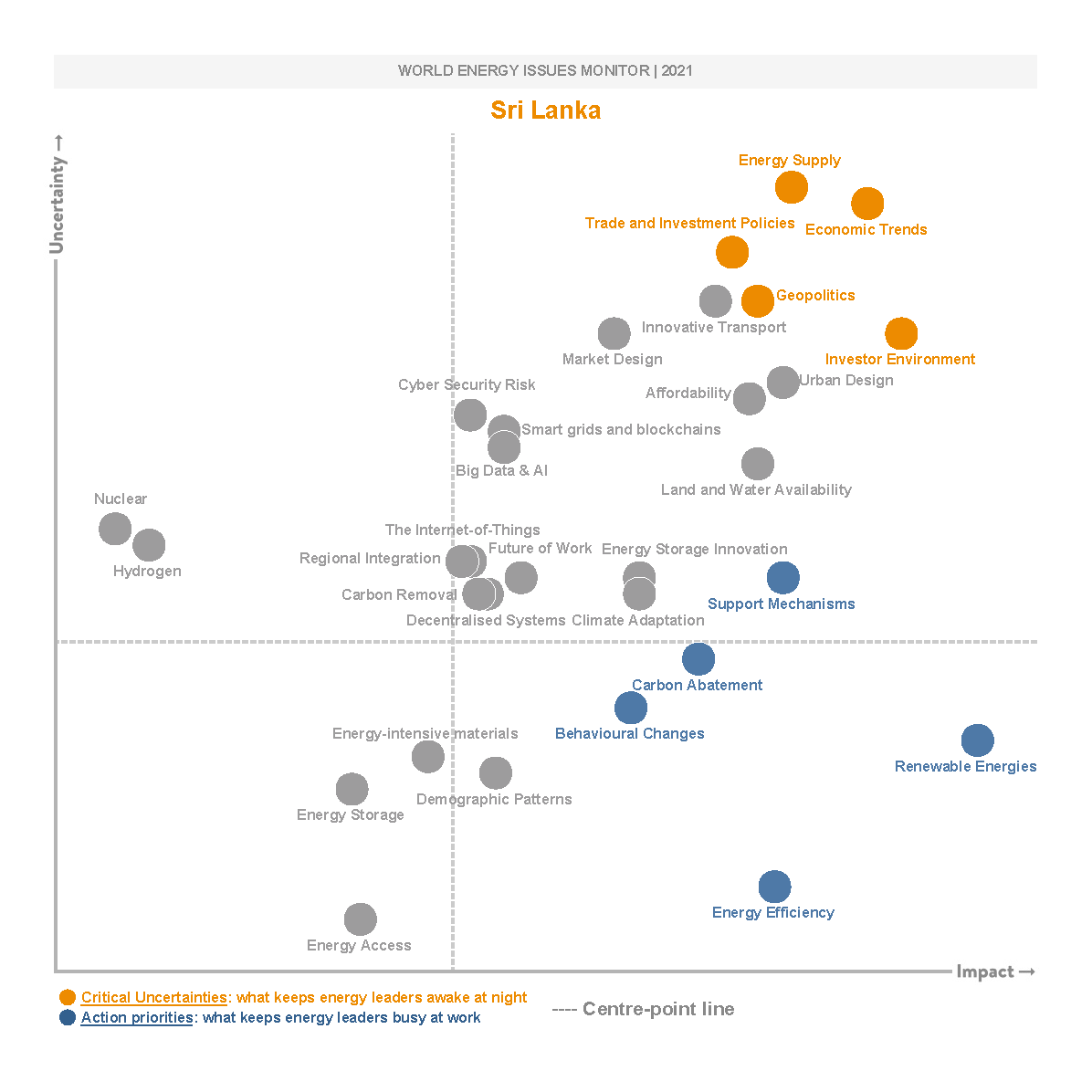The Sri Lanka National Committee aims to promote sustainable energy development in Sri Lanka, as a part of the World Energy Council’s energy vision. As a member of the World Energy Council network, the organisation is committed to representing the Sri Lankan perspective within national, regional and global energy debates. The committee includes a variety of members to ensure that the diverse energy interests of Sri Lanka are appropriately represented. Members of the committee are invited to attend high-level events, participate in energy-focused study groups, contribute to technical research and be a part of the global energy dialogue.
Energy in Sri Lanka

As many other countries, Sri Lanka experienced unprecedented circumstances as a result of the Covid-19 pandemic, and the subsequent slowing down of economic activity has affected many sectors including the energy sector. Efforts to facilitate a gradual recovery of the economy as well as the energy sector are attempting to address the renewed challenges under ongoing uncertainties. According to projections, the Country’s economy is expected to rebound, but the recent unexpected resurgence of Covid-19 is likely to curtail momentum, and hence economic trends are accorded a high level of uncertainty. Despite the short-term reduction in energy demand in electricity and transport sectors due to lockdown measures, uncertainties are high on the energy supply side as a result of the country’s high import-dependence and the prevailing global impact of the pandemic. The investment environment to support development activities in the energy sector has been adversely affected by the coronavirus crisis, but the improved political stability and growth-oriented policies targeting fast recovery are moving in positive directions. (Recent Economic Developments: Highlights of 2020 and Prospects for 2021, Central Bank of Sri Lanka).
The heightened uncertainties in the energy landscape have raised concerns on energy security as well as environmental sustainability and has resulted in a shift in focus towards developing indigenous resources. Raising the share of renewable energy sources in the primary energy supply portfolio is recognised as a priority area to achieve a higher degree of resilience, as well as to maintain low carbon intensity in the energy sector. Recent policies have ambitiously set targets to enhance renewable energy contribution in the energy sector to reach high levels by 2030. Wind and solar resource development is progressing in small- to large-scale projects and competition has brought down the cost of renewable energy to lower levels. Amid the challenging circumstances, the development of solar PV has accelerated and is expected to grow further with small- to large-scale schemes with increased participation from the community. The country is embarking on natural gas as a new addition to the energy mix, which will further diversify the primary energy supply and strengthening energy security in the long term. Natural gas is expected to play a key role together with renewable energy in curbing carbon emissions and adhering to national obligations on climate change.
Moving to higher shares of low-carbon energy sources have prioritised new concerns in the electricity sector in the areas of grid integration, innovative funding and financing mechanisms. New institutional arrangements and business models are needed to facilitate targeted development. Similarly, applications of energy storage technologies as an enabling element for electricity supply security is beginning to gain wider attention. Efficiency of electricity networks has improved remarkably over the years due to loss reduction efforts and a further range of activities are progressing in improving the efficiency in energy use applications (Energy Management Standards, Sri Lanka Sustainable Energy Authority). As the country progresses through this energy transition, new opportunities have opened up in the energy sector, such investments in the natural gas value chain, improving energy efficiency, demand-side management and avenues to decarbonise the transport sector.
Sri Lanka has demonstrated better level of preparedness to withstand major challenges such as pandemics and natural hazards. However, an improved level of resilience is necessary in countering malicious risks, extreme weather events, as well as the demand side impact on business operation, especially in the transport sector. Unprecedented challenges and uncertainties currently being experienced have realigned priorities in the energy sector, creating a new window of opportunity to enable a more resilient and sustainable transformation.







